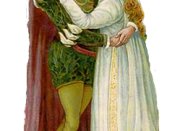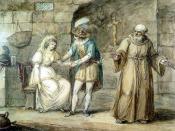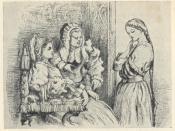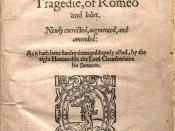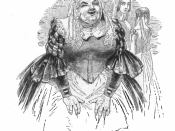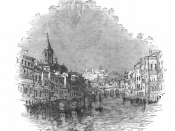The tragedy of 'Romeo and Juliet' is one of Shakespeare's most famous plays. It was written in the late 16th century. The contemporary society is reflected throughout the text; one in which men rule and women are viewed as possessions. In comparison to its predecessor, Scene 5 is extremely long and mostly fast paced, shown by commas, Shakespeare's use of language and stage directions e.g. 'enter Nurse hastily'. This scene is pivotal to the play, things change as a result of this scene. Scene 5 also has a dramatic mood swings and strong language and by its end changes the audience's views on more than one character. Act 3 Scene 5 is focussed on Juliet, and she remains on stage throughout. The scene begins with love, and ends in hate. It begins with the tenderness of Romeo and Juliet's love for each other, and ends with Capulet's rage that his daughter won't accept the arranged marriage to Paris.
The scene starts in a tender, loving mood, with Romeo and Juliet together on the morning after their wedding night. Shakespeare shows the couples unity by having them share a rhyming couplet. There is a lot of imagery relating to the lark and the nightingale. To start off, Juliet wishes it to be night and wants it to be the nightingale that sang, but Romeo is more realistic and knows that it was in fact the lark signifying dawn, his time to leave. The script states how light is their friend, day their enemy, 'more light and light, more dark and dark our woes'. There are many references like this to quite a few opposites such as youth and age, hate and love and slow and fast. The conversation switches and the atmosphere becomes more urgent when the word 'death' is spoken by Romeo, as it brings Juliet back to the reality that is if Romeo does not go, he will in fact be killed. Dramatic irony is present here when Romeo says that he is prepared to die for love, 'come death and welcome, Juliet wills I so' but this, as the audience knows, is in fact why he dies. It is because he believes he cannot bear a life without Juliet, his love. Juliet makes reference to a meteor; meteors were seen to be bad omens in Elizabethan times. It is ironic because at this point in time, Juliet thinks that it is so bad that Romeo has to leave, she -unlike the audience- doesn't know that Romeo is soon to die.
Romeo has a more mature view than he would have had earlier in the play, shown when he looks to the future to reassure Juliet, '...and all these woes shall serve for sweet discourses in our time to come'. The two lovers have few fleeting moments (only 36 lines) together in this scene before Nurse interrupts them to announce that Lady Capulet is on her way. Here, Shakespeare has rapidly got rid of the loving mood to keep the audience's attention. The change of pace is introduced when Juliet realises that Romeo must go and then everything is rushed *QUOTE*. The audience sympathise with the young lovers, as they all know that it is the last time that the two will see each other alive.
An interesting character combination is that of Juliet and Lady Capulet. Their relationship, although mother and daughter, is very distant, and in no way does either acknowledge the other with much more than formality. Juliet has a much closer relationship however with Nurse, who has cared for her all her life. This type of relationship between mother and daughter of the Capulets' social status, and daughter and nurse is quite typical of the Elizabethan period.
When Lady Capulet enters the scene and begins to comfort Juliet about Tybalt's death, she has no idea that it is in fact Romeo Juliet is upset about. There is a lot of dramatic irony shown in the time that Lady Capulet is on stage, simply because in trying to comfort Juliet, she is threatening to kill Romeo. The audience knows that this is the last thing that Juliet would wish for.
By being ambiguous, Juliet deceives her mother and manages not to either give away her true feelings for Romeo, or condemn her husband. She makes many speeches that can be taken two ways. One way taken by Lady Capulet who is not being told or knowing about all that is going on between Romeo and Juliet, and another taken by the audience who is like the fly-on-the-wall as they have seen the play from every characters view and knows things that other characters may not. Lady Capulet hears the line 'with Romeo, till I behold him - dead - is my poor heart' said by Juliet, as against Romeo (Romeo dead) however Juliet means it as 'dead is my poor heart' at the loss of her lover. Ambiguity is also shown when Juliet says 'I would temper it [the poison]' This could be taken both as to weaken the poison to save Romeo, or to strengthen it to kill him.
When Lady Capulet announces to Juliet that she is to be married to Paris, she doesn't want to hear of it an instantly refuses stating that she would rather marry Romeo (ironic because we know that she has already) showing how great her distaste for the arranged marriage is.
Capulet enters soon after Lady Capulet and asks if she has delivered the news of the marriage proposal, as soon as Lady Capulet tells him of how Juliet has reacted, he goes into an instant rage at the knowledge that his daughter is disobeying him - unheard of in this historical period. He goes into a flurry of rhetorical questions 'How will she none? Doth she not give us thanks? Is she not proud?' then he also increases the speed by use of commas and repeats 'how, how how, how' and then proves the extent of his fury by calling her a mixture off terrible names such as 'minion', 'tallow-face', 'hilding' and worst of all 'green-sickness carrion' meaning that she is a anaemic corpse, pale immature and foolish. A range of terrible things that a father should never say to his daughter, therefore Shakespeare is gaining a lot of sympathy from the audience for Juliet. Capulet tells Juliet that if she doesn't turn up for the wedding on Thursday, then she should never look him in he face again. He threatens her quite a few times about how she must turn up and then he states that his 'fingers itch' showing that maybe if he had been pushed that slight bit further he may well have from ca truck Juliet. This speech from Capulet dramatically changes the audience's view of him for the worse. Before, in Act 1 Scene 2, Capulet speaks of his daughter tenderly and how Paris should 'woo her [Juliet] gentle' but now he seems heatless and to only care about his own dignity. In the end, ironically, Capulet's final threatened punishment is banishment, the same as Romeo.
Juliet finds herself helplessly alone after Capulets longer speech and tries to turn to her mother for support 'O sweet my mother cast me not away' and asks her to delay the marriage for 'a month, a week' the time periods getting shorter showing Juliet's desperation. Lady Capulet replies with 'Talk not to me, for I'll not speak a word. Do as thou wilt, for I have done with thee' showing no love for her daughter and simply throwing her aside and saying that she doesn't care what happens to her.
Finally, Juliet turns to the only one left and the only person throughout the whole play that she has trusted fully, Nurse. By this time, both Capulet and Lady Capulet have exited. Nurse then says to Juliet and ties to persuade her to marry Prince instead of being faithful to Romeo who Nurse says she doubts will come back for her. This shocks both the audience and Juliet as she thought that Nurse would be the one person she could turn to in a time of crisis like this, and also, Nurse seemed so eager to help make Romeo and Juliet a couple earlier in the play However Juliet now finds herself totally alone and alienated from both her parents and her confidante. Juliet acts coolly towards Nurse but after Nurse has exited, she curses her 'O most wicked fiend' and speaks of how she will go to the friar to see if he can help her find remedy for the situation at hand.
The last word of the scene is 'die' creating a very dramatic and bad felt ending and although the play 'Romeo and Juliet' is based around love and hate, I think that this ending makes the whole thing seem more to the negative side of the two.
